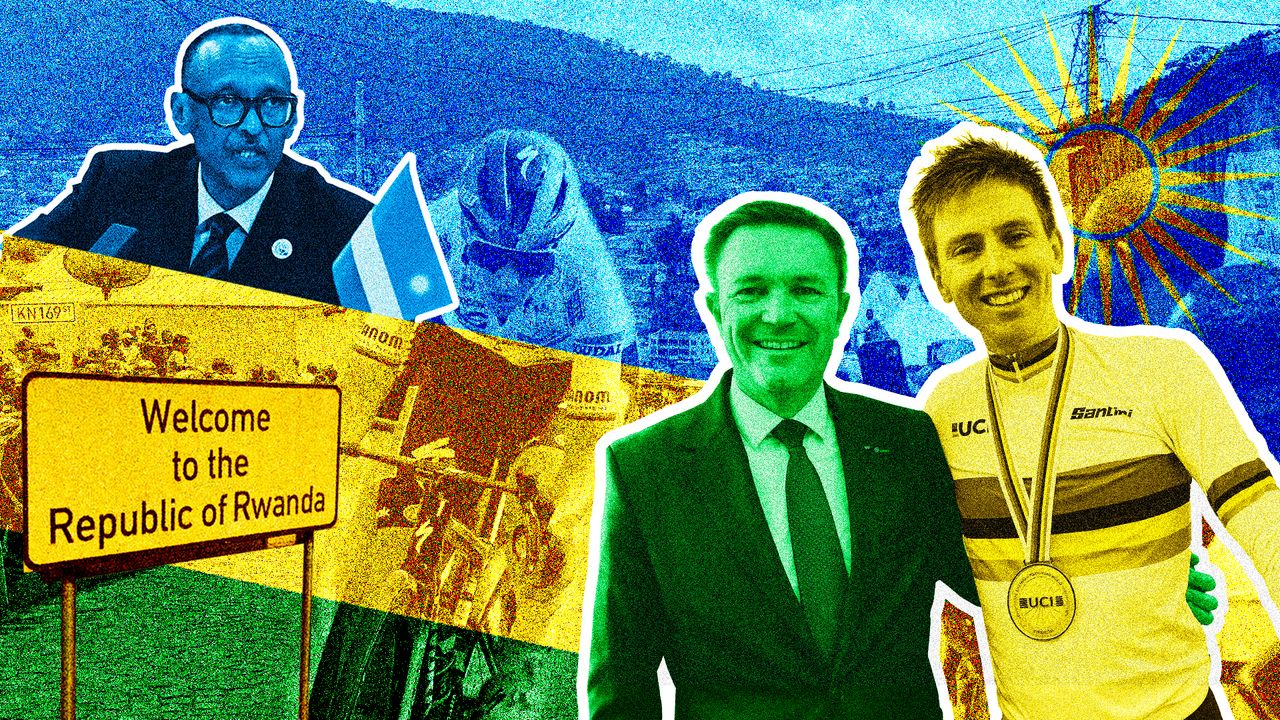
It’s Friday afternoon, a month out from the UCI Road World Championships, and Samson Ndayishimiye, head of the Rwandan Cycling Federation (FERWACY), has ducked out of a meeting to speak to me.
“I have had hundreds of thousands of meetings as we are double and triple checking everything ahead of Kigali 2025," he says.
Steeped in more than 100 years of history, this year's Road World Championships will be held from September 21-28 in Kigali, Rwanda, and it marks a culmination of six year’s work from bidding for the right to host the blue riband cycling event for the first time on African soil, in what had been a dream for President of the Union Cycliste Internationale, David Lappartient.
It was just over 20 years ago, in 2004, that executives at FIFA put in place its dream to hold the Football World Cup on the African continent for the first time in history. This was awarded to South Africa, ahead of Morocco, and in 2010, the tournament was held on African soil for the first time ever. Other major tournaments had already taken place in Africa; Formula 1 in South Africa in 1993, the Rugby World Cup in South Africa in 1995, and the Cricket World Cup co-hosted by South Africa, Kenya and Zimbabwe in 2003.
Sports federations and organisers had been steadily considering hosting major international events in the African diaspora, and in the same vein, Lappartient made it part of his manifesto to deliver the road cycling Worlds in Africa when he was elected as head of the sport's governing body in 2017., following on from the Mountain Bike World Championships in South Africa in 2013. The UCI executive committee designated 2025 as the year that the championships would again be held on that continent, and bidding was opened solely to the 54 African federations.
Why Rwanda?
A number of countries expressed an interest in holding this week-long international road cycling competition, though in the end, it was only Morocco and Rwanda that submitted a formal bid.
The North African country lost out to Rwanda in the vote, and while Morocco may have boasted decent infrastructure, Rwanda also had the track record after having hosted the Tour of Rwanda, UCI 2.1 since 2009, as well as having a strong cycling fan base.
Photos of the crowds of roads lined with crowds, notably as the international peloton scales the Mur de Kigali, a famous and challenging cobbled climb located in the capital city that will be one of the centre points of this Worlds circuit, have become akin to those of the country’s Belgian equivalent, at Geraardsbergen.
“We know that there will be crowds along the roads in Rwanda, and we expect to have around one million people per day watching the races on Saturday and Sunday during the elite [road] races, and we estimate to have around 3.5 million people out in total for the whole week. And if that happens, they will be the biggest crowds for a World Championship. So, I think this will give a very positive image of the passion for cycling from Africans," Lappartient tells Cyclingnews.
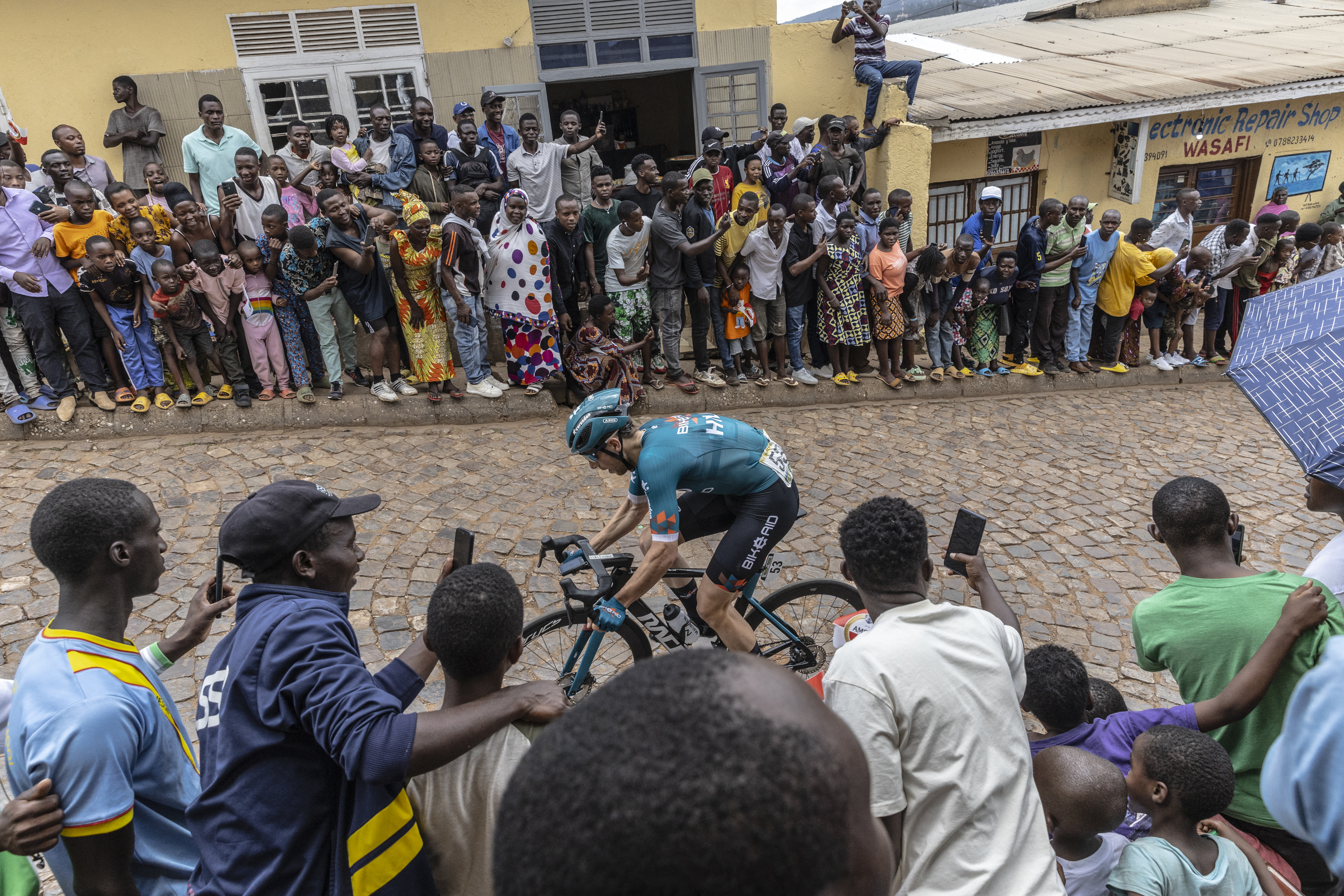
The Tour du Rwanda has proven the appetite for bike races in Rwanda
In fact, a number of sub-Saharan African riders in recent years have helped to raise the profile of cycling in the content. Riders like Tsgabu Grmay, Daniel Teklehaimanot, Natnael Berhane or more recently Biniam Girmay and Amanuel Ghebreigzabhier have hailed mainly from Ethiopia and Eritrea, though Rwanda has had its own talisman in the shape of Adrien Niyonshuti.
The 38-year-old, now retired, was the first Rwandan to take part in the Olympic Games - cross-country mountain biking at London 2012, and road race at Rio 2016 - and is the only Rwandan to have raced for a WorldTour team.
As one of the riders featured in the 2012 film, 'Rising from the Ashes', documenting the development of the Team Rwanda cycling team after the 1994 genocide, in which Niyonshuti lost six of his brothers, the man from Rwamagana has been a great inspiration to Rwandans.
As far as the Worlds are concerned, Lappartient says that it was important to choose a country that has a real passion for cycling and with the knowledge and capacity to organise an event like this. Rwanda ticked all the boxes and had the support at the highest level in the nation, from the nation's President, Paul Kagame.
Such factors will have convinced the sport governing body in September 2021 to choose Rwanda, specifically the city of Kigali, as the host of the 2025 Road Cycling World Championships.
Africa Rising
These attributes were helped in no small part by Africa Rising, an association set up in 2007 that has helped increase cycling in Rwanda and that continues to support African riders through training camps and races from its base in Rwanda.
The outfit has become the go-to place for aspiring African riders before they are talent-spotted by the UCI and can be developed further at its training centre in South Africa or at the headquarters in Aigle, Switzerland.
“I’m incredibly proud of the work we’ve done, and we are one of the significant pieces in the puzzle and the building block to making this happen," Africa Rising CEO Kimberly Coats tells Cyclingnews, recalling the beginnings at the Wooden Bike Classic back in 2006, at a time when cycling as a sport was limited.
“The country went from having zero points on the UCI Africa Tour, to multiple Olympics, to being in the top three African countries. They were the top nation in the U23 men at one point, and they were riders that we had trained."
The growth continued at the Tour du Rwanda, a race that has been held since 1988 but that only joined the UCI international calendar in 2009.
"If it wasn’t for all of that, [the Rwanda World Championships] wouldn’t have happened. I am sure that Rwanda will do a great job in hosting the Worlds, but I don’t know how much will go into developing Rwandan cyclists afterwards," Coats adds, while also speculating on the level of preparation cyclists from Rwanda would have achieved this season.
"Currently, Rwanda is [fourth - ed.] in the UCI Africa Tour, meaning that they are not obliged to receive invites to the big races in Africa, as it’s the top three nations that are invited. So many Rwandan cyclists may not have done much racing since the Tour du Rwanda in February this year. That’s not the best preparation for the Worlds.”
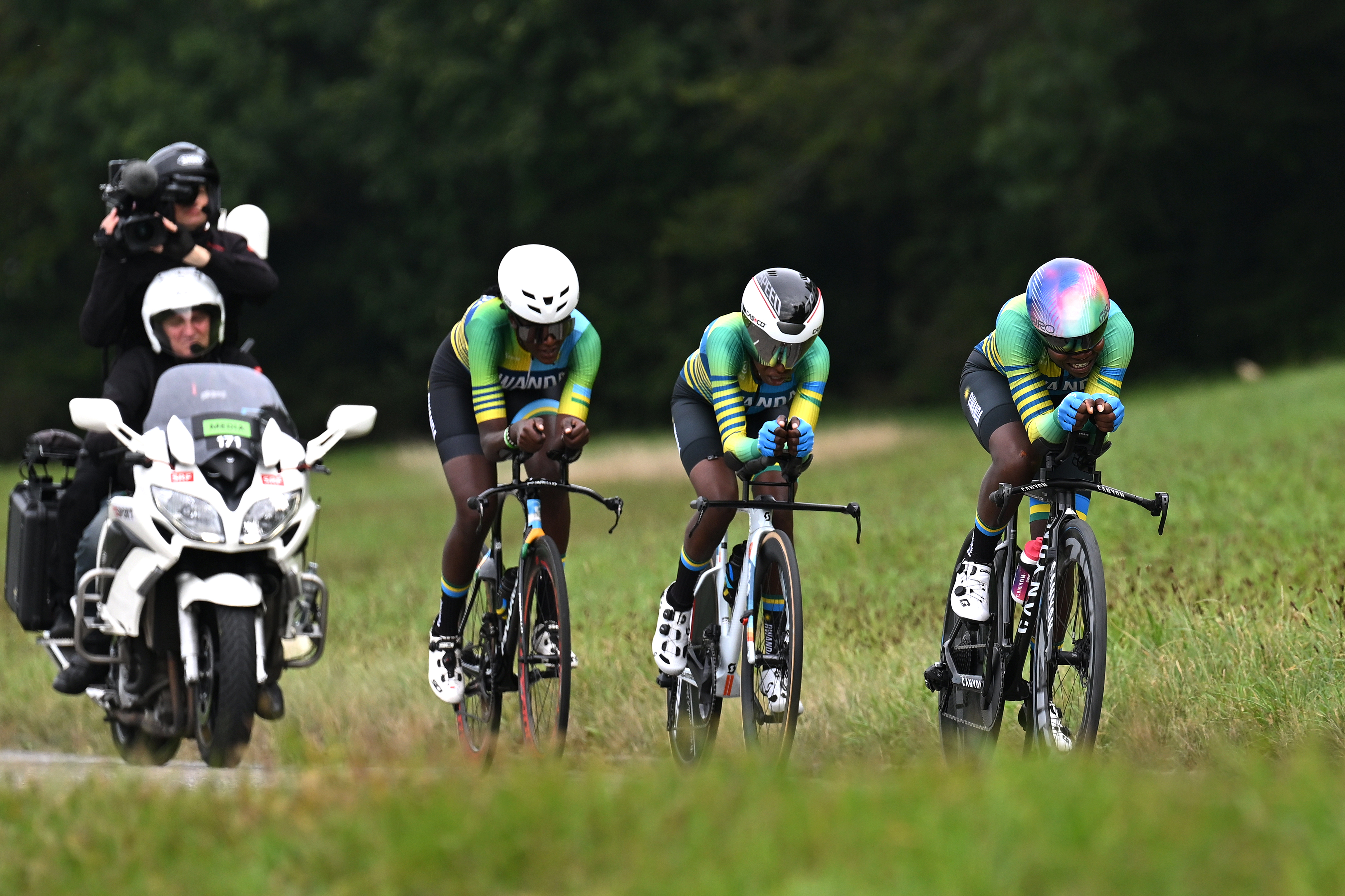
Rwanda competed in the Mixed Relay TTT at last year's Worlds, let by Canyon-SRAM Generation rider Diane Ingabire
Africa Rising was not specifically involved in the bid for these Worlds, and they aren't involved with the Rwanda Cycling Federation, which has seen a change in the leadership on two occasions in the last six years, following different alleged scandals.
These days, the association is involved in training riders from other African nations, not just Rwanda, and the organisation has been working closely with the Benin Cycling Federation in preparing its riders for the Worlds.
“We’ve had riders training with us in Wyoming, as it’s high altitude, as there are no hills in Benin. We [had] a team taking part in the Maryland Cycling Classic by invitation. This [was] the first time ever that a women’s African cycling team [took] part in a US event on US soil. So this [was] a big deal for us.
“The Worlds course is going to be brutal, and tough to finish unless you are a rider who has already been racing on a pro team and doing WorldTour events. It’s going to be interesting to see what happens.”
Coming to Kigali
As for the Rwandan authorities, the World Championship is an exciting opportunity and part of their plan to give the country a makeover following the tragic events in 1994, in which up to 800,000 people, mainly ethnic Tutsi, were massacred by Hutu rebels over 100 days.
The nation, under the long-standing President Paul Kagame, has worked to rebuild itself after those dark days.
In a nation dubbed the 'African Singapore', on account of its exponential economic development in the last 30 years, sport is seen as one of the ways of doing this. Indeed, the country has promoted large-scale events in basketball, tennis, golf, and cycling. Officials also hope to host a Formula 1 Grand Prix in 2027.
The East African country has a comparable surface area to Belgium, of which it is a former colony, and one of the smallest nations in Africa. Its natural history is rich with national parks peppered with extinct and a few active volcanoes, forests and a gorilla reserve, as well as over 100 lakes, and of course, hills.
Like any nation hosting a major sports event, and an elite cycling race, in particular, television coverage provides the opportunity to show off its best side, and this has been seen as an opportunity for the Rwandan tourist board.
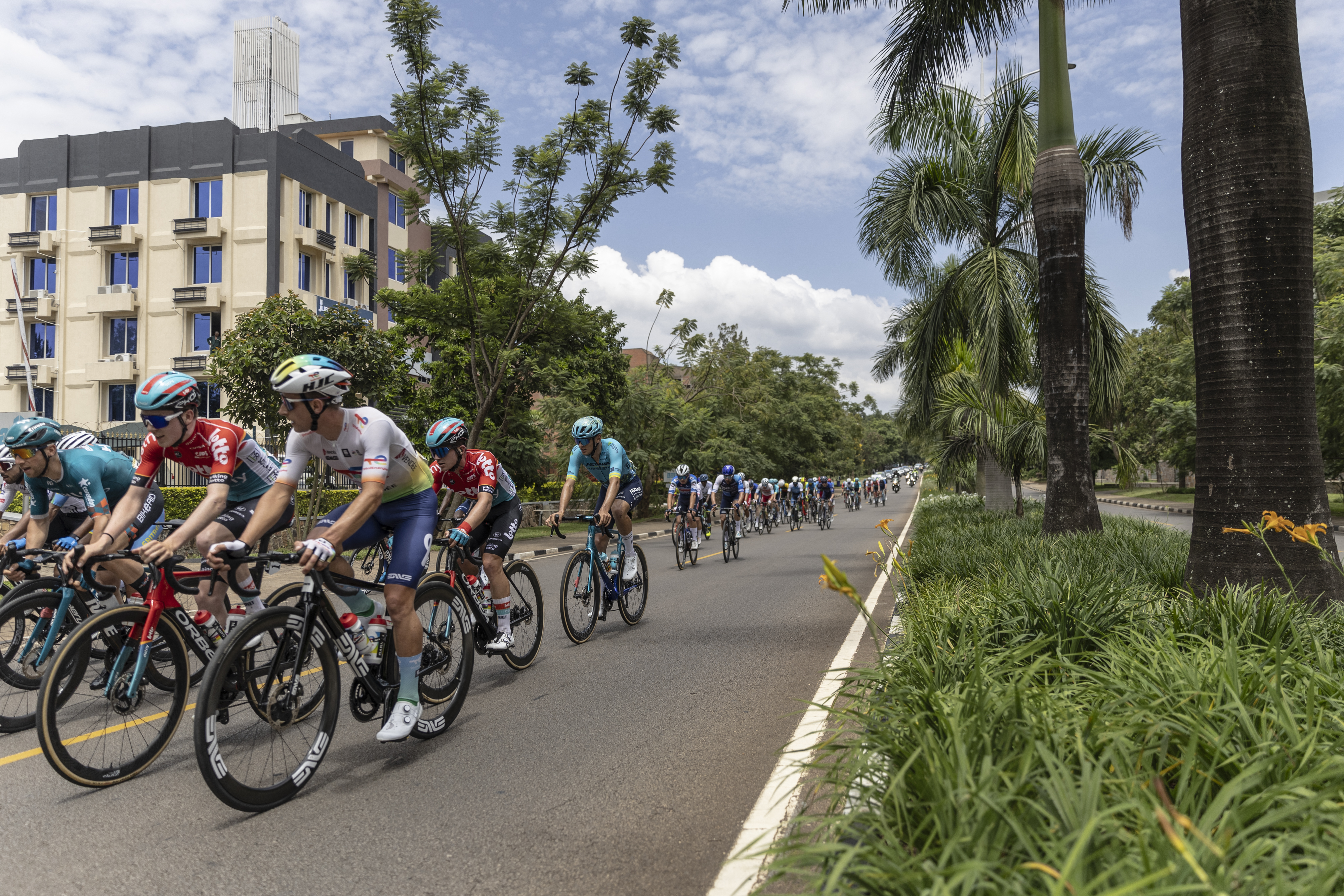
The Rwanda World Championships will show off the sights of the capital, Kigali
The bumpy road along the way
Despite all the positivity around the Worlds, at times the road has been bumpier than a section of Paris-Roubaix pavé, with a danger of a pile-up and the wheels coming to a complete halt.
While the Tour du Rwanda, though a comparatively small-scale race with around 20 five-man teams staying in Kigali on the first and last day of the eight-stage race, the World Championships will host a massive cycling community of around 70 federations or more, each containing a couple of dozen of the world’s top riders and their support staff, all housed in the Rwandan capital.
However, its organiser, Olivier Grandjean and his company, GSO Sport, were the ones with the logistics expertise to deliver Kigali 2025 to the standards expected by the UCI. Unfortunately, in 2023, the sudden departure of Grandjean from the organising committee left the Rwanda Cycling Federation looking for a new event delivery partner with two years to go.
At this point, Amaury Sports Organisation - organisers of the Tour de France - and Golazo Events, which organise cyclo-cross, gravel and classics Belgian road races, stepped in to help.
While Kigali has the state-of-the-art Convention Centre and high-end hotels to host the various national federations, other preparations needed to be put in place - for example, extra flights to Kigali from Europe, a welcome centre at the airport for competitors, organising aircraft for the televising of the event, and fencing for crowd control.
Also in 2023, the then-president of the Rwanda Cycling Federation, Abdallah Murenzi, left under a cloud following accusations of corruption within the federation. This was the second scandal in four years to come to light within the nation's cycling governing body. Once again, a new president took office, former Olympic swimmer Samson Ndayishimiye.
Conflict, uncertainty and safety
As preparations entered the home straight, things were again thrown into doubt at the start of 2025 as pro-Tutsi groups from the M23 movement and Congolese armed forces resumed hostilities on the Western border with the Democratic Republic of Congo (DRC), 160km away from Kigali, in Goma.
This threw the Worlds into doubt, leading to urgent meetings between Lappartient and Kagame. A ceasefire deal between opposing sides was signed in Qatar in June of this year, though negotiations are still hanging in the balance.
Accusers have alleged that the M23 group is funded by the Rwandan government, though the latter refutes these allegations.
"Of course, we are always following the geopolitical situation and that was part of my discussions with President Kagame in February this year. I am very happy that a peace agreement has been signed between the two countries. I have been in touch with the DRC National Federation in order to assure them that their athletes are clearly welcome," says Lappartient, as he is in no doubt that the Worlds will take place in Kigali.
"President Kagame mentioned to me face-to-face that the athletes from DRC are more than welcome in Rwanda, and we are a tool for peace, not a tool for sanctions. We are clear that all nations have the right to participate if they are affiliated to the UCI, including DRC and this was affirmed by President Kagame himself. Needless to say, we are happy that the pressure has decreased at the borders."
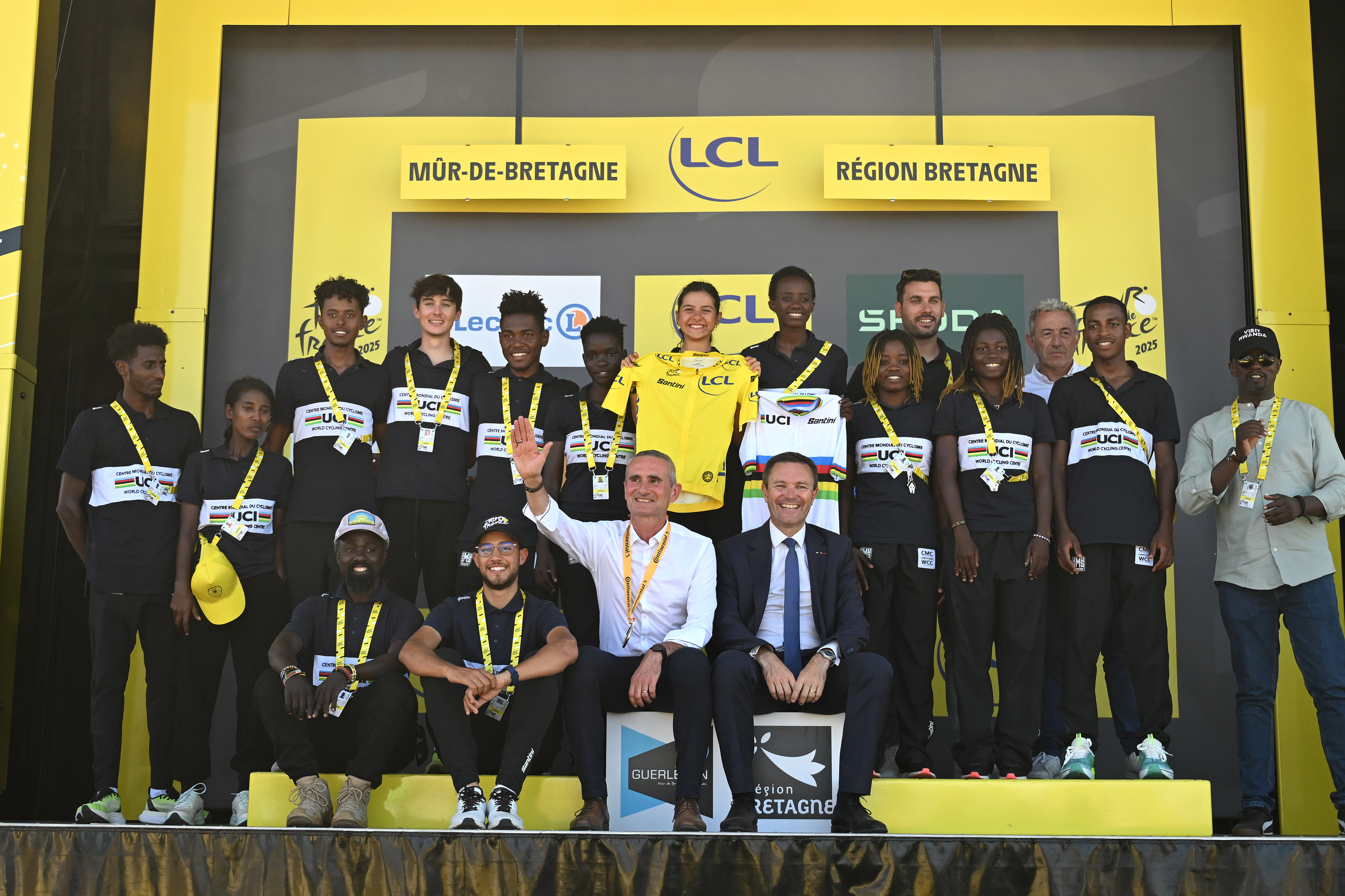
Lappartient and Ndayishimiye hosted a delegation of African riders and the organisation committee at the Tour de France this summer
Ndayishimiye was more philosophical on this subject, telling Cyclingnews, “There are things happening all over the world, like in Russia and Ukraine, which is heartbreaking. I live in Kigali and have never been to DRC, and I don’t know everything that is happening there, as it is a totally separate country.
"It’s like when you’re in London and then someone is asking you about what troubles may be happening in France. It’s a totally different country. In any case, in sport we are neutral. For us, the [World] championships are definitely happening, as the UCI President has said, we are well into preparations and we are ready to host the world.”
African talent
In terms of showcasing athletes from Africa, these championships represent a golden opportunity. In previous World Championships, many African federations could only send reduced delegations, if any at all, owing to the transportation costs to reach Europe or the United States and further afield. So for once, more African countries can field more ample teams.
In the hope of preparing more African riders for the elite championships, the UCI has had an unprecedented involvement in this preparation. The World Cycling Centre, the innovative facility in Aigle, Switzerland, has been hosting and training promising African riders since the noughties.
From their talent, the likes of the first Black African wearer of the Tour de France polka dot jersey, Daniel Teklehaimanot, have emerged, as well as others, including Selam Amha Gerefiel, Ryan Gibbons, and Biniam Girmay, the first African to win the green jersey in the Tour de France, and the first Black African to win stages of the Tour, the Giro d’Italia and a WorldTour race.
Additionally, the UCI began collaborating with the Association of National Olympic Committees of Africa in 2022 to develop African athletes specifically for the 2025 Championships.
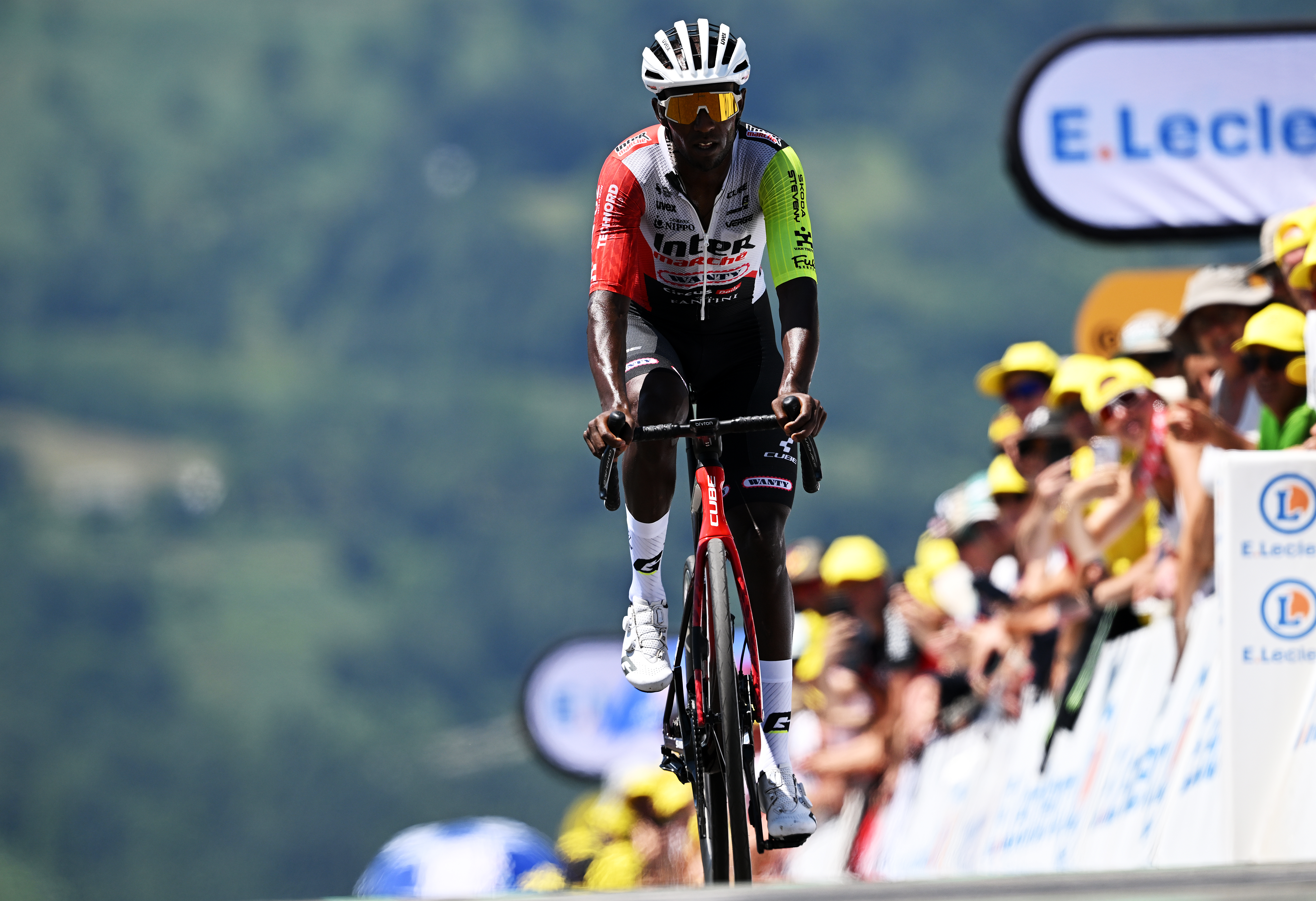
Biniam Girmay is likely the most well-known African cyclist, and will represent Eritrea at the World Championships
Through its UCI Africa 2025 programme, the governing body is also working to identify young athletes who can compete on the streets around Kigali, including at the first-ever U23 women’s race during the last week of September. Among them has been Xaverine Nirere, who is the current national time trial champion on Rwanda.
“With Africa 2025, the goal was to bring athletes to the highest level they can reach and then for them to take the start and be competitive in the race. We have 15 athletes, and over the last four months, they have been racing in Brittany, where there are a lot of races, so riders can do two or three races per week," Lappartient explains.
"We have riders from different countries in Africa, with the capacity to at least finish the race and maybe to have a good ranking. So we are really taking care of them. It’s not just about the number of people taking the start, but also having good competitors. That was clearly our mission.
“In addition, we have a more widespread programme in which we sent a letter to all 54 African nations, inviting them to our four-week training camp in the suburbs of Kigali, starting on September 1.
"It will be for one man and one woman per country. Of course, there will probably not be a world champion, but the rider can still reach a good level, and we can detect potentially good riders. So this year we are investing a lot into African cyclists and we will have mechanics, physiotherapists, and coaches taking care of them.”
Alpine success
Another Rwandan rider, Jazilla Mwamikazi, impressed Jacques Landry, who is the director of the World Cycling Centre, to the point that he could not ignore her potential, and Lappartient rode with her recently in Brittany and he also noticed how strong she was.
The 20-year-old, who recently competed in the Tour de l’Avenir which took place in the French Alps, has been racing for the Ndabaga cycling team since 2022 - Ndabaga refers to a woman warrior in Rwandan folklore - a team founded by Shannon Porthault as a way of getting more women into cycling, but also to promote education.
Through being on the team, women could have access to regular education - something that is not always available to young girls in the country. In parallel the American, who now lives in France, runs a Rwanda bookmobile scheme in which people ride to different schools to read stories to Rwandan children.
The youngster has made astronomic in her cycle racing, having competed in the cross-country mountain bike race at the Paris Olympics, the World Road Race Championships in Zurich and in Glasgow, as well being the National Champion in Road Racing and U23 time trial. This has been a baptism of fire.
“Jazilla’s progress has been wild - winning the continental mountain bike championships, going to the Olympics, doing the Worlds. We work as a team of four to keep her in a safe space and give her the best chance. We really work on keeping her smile, her strength, her safety and her journey to be mentally sound as it can be tough out there," Porthauld says.
“The course is going to be tough, though we have tried to make the most of home advantage by having our girls go out and ride on the course. It’s going to be a real ride, as some of the climbs will have cobbles too. It’s going to be hard to finish the race, but that would be the goal – for just one of our girls to finish. When I look at how far Jazilla has come I am just so amazed – this young woman from Rwamagana where the family would cook in an outdoor kitchen, has come out of poverty through education and cycling.”
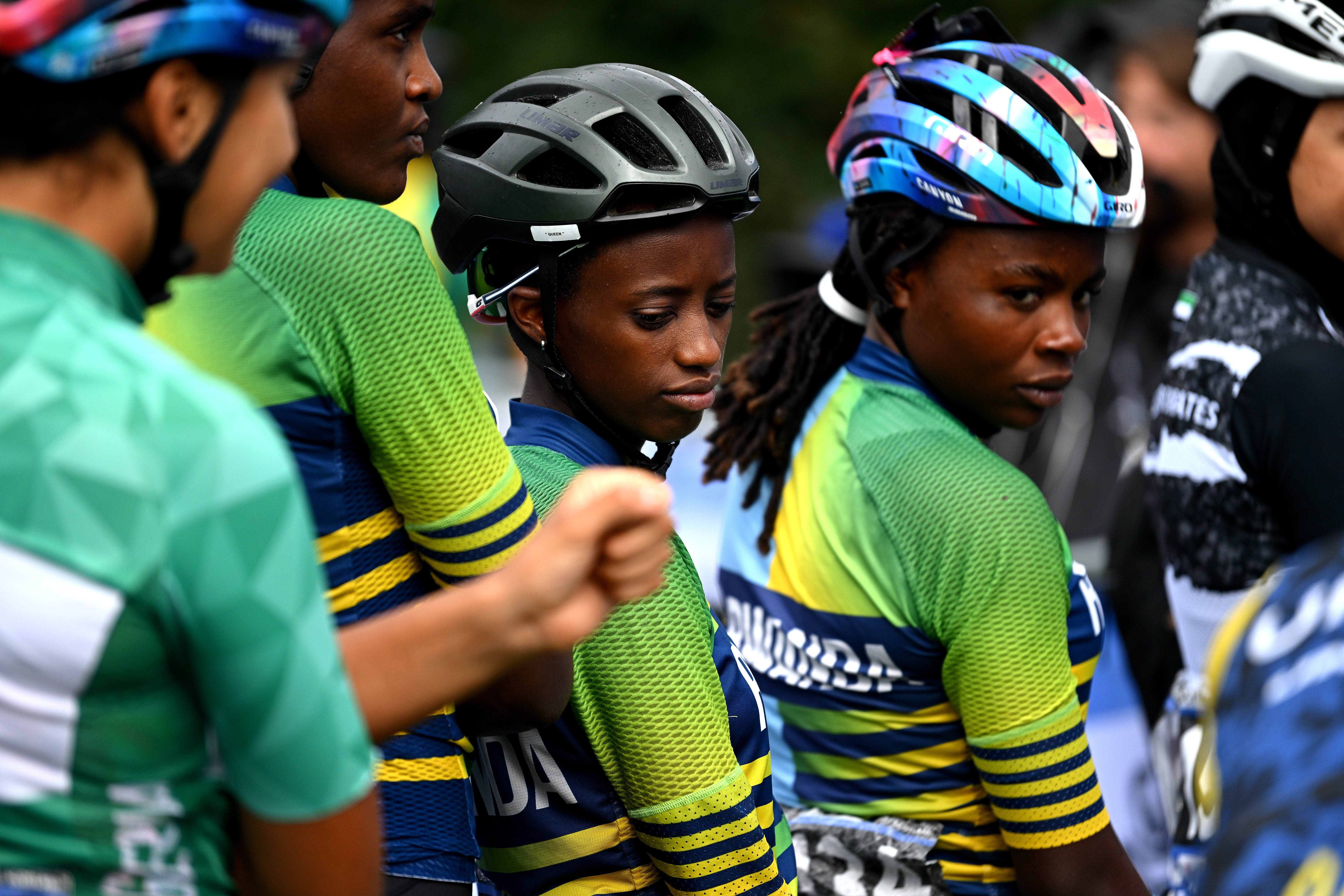
Mwamikazi represented Rwanda at the World Championships in Glasgow
Speaking to me before taking part in the Tour de l’Avenir, Mwamikazi recalls her beginnings into cycling.
“When I was small, my mum bought me a bike, and sometimes I would ride for fun or go to school or shopping by bike. And then I saw the Tour du Rwanda and I thought, maybe I can do that. I joined a local club and a coach trained me. I continued to train and my family supported me. I have been in Aigle and they [the UCI] are also supporting me," she says.
“I really like Pauline Ferrand-Prévot and Kasia [Niewiadoma-Phinney] and also Kim [Le Court-Pienaar]. She makes me feel like I can do it, because she is from Africa. Kim was super good in the Tour de France and I cried when she had the yellow jersey.
“Having the World Championships in Rwanda is really super cool. I think it will be hard, but I have done a lot of training so I just have to try my best.”
The hills are alive in Rwanda
For the Rwanda Cycling Federation president, this is the biggest opportunity that the Rwandan cyclists have ever had in a World Championships.
“The athletes are doing well, and we are doing as much as we can to give them a good opportunity as the host country," he says.
“We could say the land in Rwanda is God-given, as it is impossible to do a route with no hills. It is confirmed that this will be the most challenging World Championships in terms of the metres of elevation gain in the men’s race, but there are WorldTour races that still have more height gain than this race. I guess it may be scary for sprinters, but we still encourage lots of riders to be part of this historical moment.”
Indeed, the route for the 2025 race will be very much for a climber. With a total altitude gain of 5,475m over the 267.5km in the men’s elite race and 3,350m over 164.5km in the women’s race, these championships are one of the most demanding.
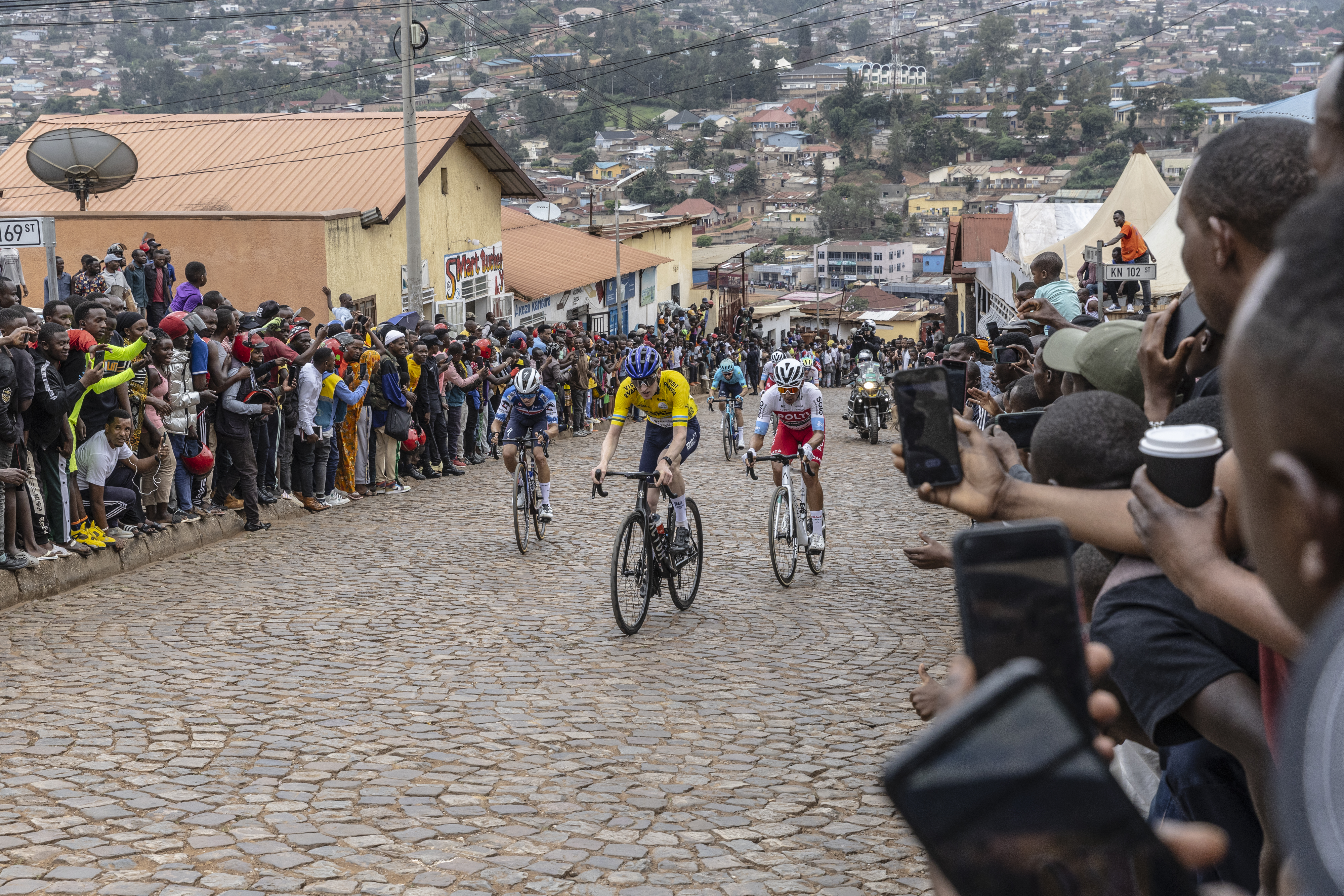
The Mur de Kigali will be a key element of the road races
This compares with 4,470m over 274km and 2,488 m over 154km, respectively, in the elite men’s and women’s races at Zurich in 2024. The men’s race will also feature an extension loop out to daunting Mont Kigali and then over the Mur de Kigali, an iconic climb regularly featured in the Tour du Rwanda, with Montmartre-type crowds on the thigh-busting gradients in the last 400m.
Given that Rwanda is known as “the land of a thousand hills,” it is no wonder that all of the competitions will involve shifting the bicycle chain to the gears on the left, not to mention the fact that Kigali lies at over 1,500 meters above sea level.
While federations will naturally field teams with climbing specialists, this won’t be so helpful for showcasing the best of African cycling when many of the best African riders are not known for their climbing.
While Rwandan riders have been prepared by various independent associations and UCI initiatives, it is not clear what specific programmes have been put in place by the Rwanda Cycling Federation, so it is difficult to know what the form is of the Rwandan squad.
Head coaches will be hoping their riders don’t get a DNF (did not finish) or OTL (over the time limit) on the results sheet. For most African athletes, finishing the race would be an achievement in itself.
Niyonshuti goes to Benin
Since retiring from professional cycle racing in 2018, Rwanda’s most successful racer, Adrien Niyonshuti, has become a coach. He initially set up an eponymous cycling academy, which trained up many of the successful Rwandan cyclists and was an inspiration for his compatriots.
He is no longer involved in training Rwandan riders, and internal issues led him to close down the academy. With Africa Rising, the former Dimension Data rider is now the head coach for the Benin national cycling team.
“I am very excited about the World Championships coming to Rwanda. It’s something emotional. I think these championships are a chance to learn more for the future and how to change things for cycling in Africa," Niyonshuti says.
"There are only one or two Tour races in Africa, even though there are 54 federations. I wish there could be more Tours and high-level UCI races, but it depends on receiving sponsorship. In any case, these championships are a good occasion for African nations to show their organisation and talent.
“As head coach of National Cycling Benin, I took riders to the Zurich Championships last year, and it was the first time we had a team, with three riders competing. The weather was really rainy and cold, and the riders were not adapted to that kind of weather. But one of my junior riders, Georgette [Vignonfodo], finished the race, which was good as it was the first time that Benin was present at a World Championship.
“We have had a really good programme for preparing for Kigali. We have three riders training at altitude in Wyoming, and I have two girls in France who are training with the UCI, and they also have a training camp to do for a month and a half, so I am praying to God to help me to help them finish the race. That is my goal, and they can show that cycling in Benin is growing.
“Among the Benin riders who I think could do well, we have Hermionne [Ahouissou], who is racing in the elite road race, individual time trial and the mixed relay time trial. Also Raimatou [Kpovihouede] is doing the elite road raced and the mixed relay time trial. One of the girls training in France, Vannette [Houssou] won a road race in Brittany so hopefully things are going well. As the course is going to be so hard, I think I would be happy to just have a few riders finishing the race.”
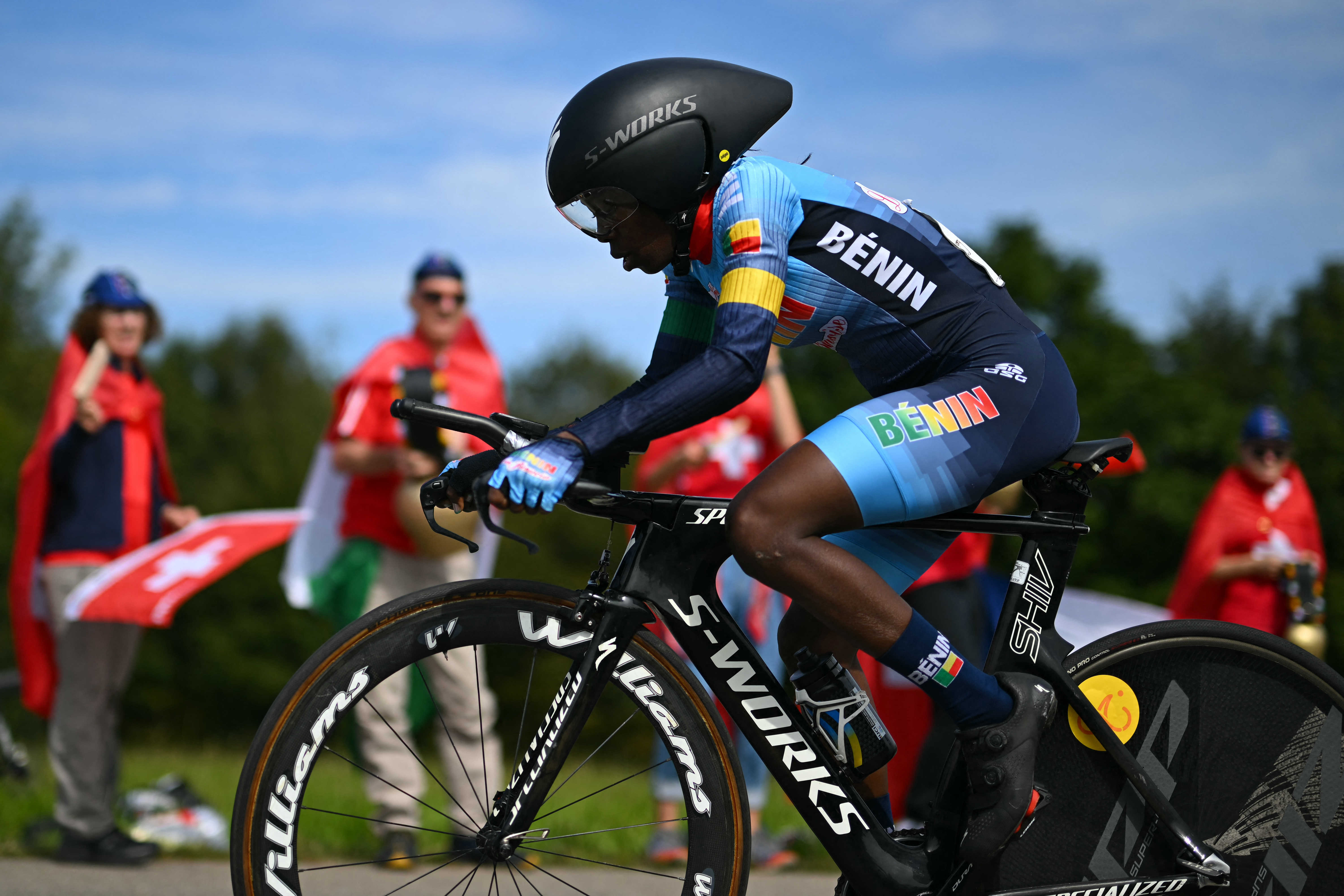
Hermione Ahouissou made her European debut at the World Championships last year
North African federations may have better possibilities of doing well. Algeria has a continental team - Madar Pro Cycling Team - which has been racing all around Asia, so they will be well prepared. Morocco may also be in the mix, as well as other nations like Eritrea and Ethiopia.
After that, South Africa will do well as they have riders who race professionally, notably Ashleigh Moolman-Pasio, who has consistently represented the African continent at the highest level with great success over the last 15 years.
She is excited to be able to compete in the World Championships on her home continent. The AG Insurance-Soudal rider says, “As a long-time advocate and ambassador for African cycling - and really one of the first African women to build a professional career in Europe - I’ve spent much of my journey fighting for greater representation of African riders in the peloton.
"As the reigning African champion, I couldn’t be more excited for the World Championships in Kigali, Rwanda. I had the chance to recon the course last November, and it’s going to be a thrilling race. This season has been incredibly challenging, but I finally feel my issues are behind me, and I’m in great shape.
"Right now, I’m at altitude making my final preparations, and I’m highly motivated to give my absolute best in the road race on the 27th. I know the atmosphere in Kigali will be amazing - the crowds, the spirit, the energy of Africa - it’s something I truly thrive on. I love Africa, and I cannot wait to race in front of a home crowd.”
Moolman-Pasio’s trade teammate Kim Le Court-Pienaar, who has proven to be a revelation this season on the Women’s WorldTour, could also do well, though she is more of a punchy climber. The Mauritian hopes to continue inspiring Africans as she races around Kigali.
“Racing the World Championships in Rwanda is going to be incredibly special. To have the chance to fight for the rainbow jersey on African soil is historic, and for me, coming from Mauritius, it feels like a home Worlds in a way. It’s bigger than just a race, it’s about showing what cycling means to Africa and inspiring the next generation.”
Rwandan legacy
Ndayishimiye is excited about staging the race and is already thinking about the legacy.
“We have already started taking measures with the UCI. In February, we opened the second UCI satellite training centre on the continent, after the one in South Africa. So this gives cyclists not just from Rwanda, but also other cyclists from Africa an option of where they can do their different camps - be it for cyclists, mechanics, coaches, commissaires - everyone involved in the cycling world," Ndayishimiye says.
"So that means we can attract different teams to do camps in Rwanda when they are getting ready for different races, including WorldTour or World Championships. The other legacy is for people – maybe the athletes with their families or other people to come and visit Rwanda, as well as cycling fans, too.”
Lappartient is also positive about the sports legacy that these Worlds will leave behind.
“This will show the power of cycling in Africa and the development we will have. I think it will also show the capacity of Africa to host and organise major events in the future – and why not the Olympic Games. It will also make Africans even prouder of their continent. I’m sure there’s a huge potential in Africa," Lappartient says.
“We can’t wait to be in Rwanda. I’m sure it will be an amazing World Championships. I think it will be great. I have been to Rwanda for the Tour du Rwanda and also for meetings, including with President Paul Kagame, and I have seen that there is a lot of passion for cycling and they are really proud to host the UCI World Championships.”
The Rwandan authorities are keen for this to be a success. In the same way as directives come down from President Paul Kagame for ordinary Rwandans to clean their local streets and repair facilities on the last Saturday of the month (a practice known as Umuganda), citizens are also being told to show up and cheer on the riders during the championships as the eyes of the world focus on Kigali.
Schools and government offices will be closed to host the championships and allow folks to watch the event.
For Ndayishimiye, it is also a personal honour to be involved in these inaugural World Championships on the African continent. It remains to be seen whether this event is a one-off or a springboard for more to come from Africa.
Subscribe to Cyclingnews to unlock unlimited access to our coverage of the first-ever UCI Road World Championships on African soil. Our team of journalists will bring you all the major storylines, in-depth analysis, and more directly from the action in Rwanda as the next rainbow jerseys are decided. Find out more.







